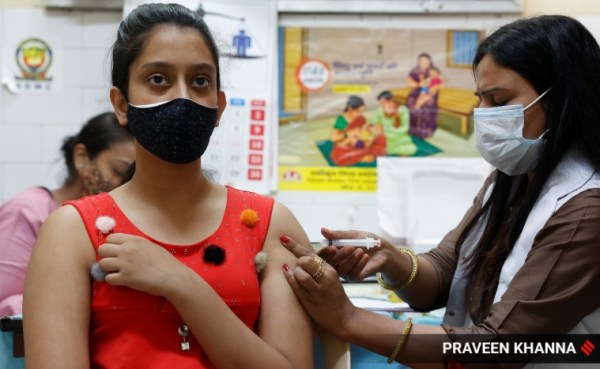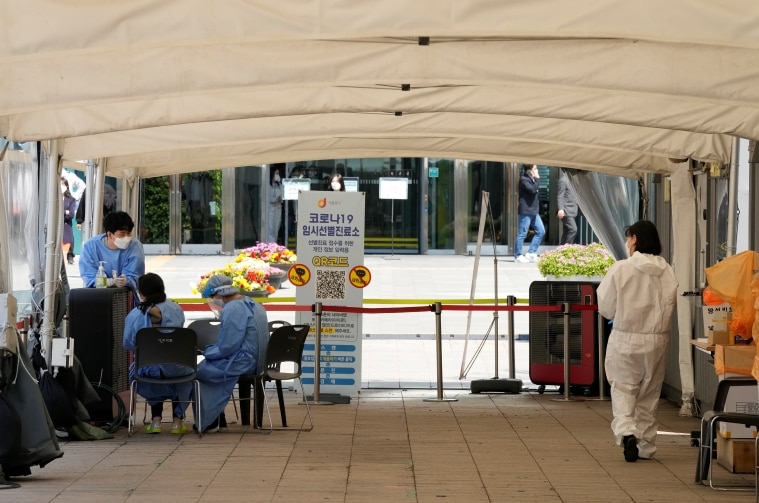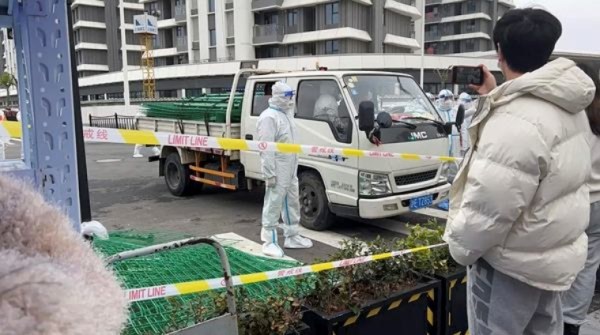Dr Peter Hotez, who co-chairs the Lancet Commission on Covid-19 Vaccines and Therapeutics Task Force, talks to Kaunain Sheriff M about the next phase in the development of Covid-19 vaccines, explains why heterologous boosters will give more “enduring and lasting protection”, says the Indian govt’s decision to “aggressively pursue a booster programme is wise”, and elaborates on the challenges of long Covid and the road ahead.
🗞️ Subscribe Now: Get Express Premium to access the best Election reporting and analysis 🗞️
Why Hotez: Dr Hotez is an internationally recognised physician-scientist and among the most trusted voices on vaccine development. The Hyderabad-based Biological E’s Corbevax, which is being administered to children between the age group of 12-14 years in India, was developed in collaboration with the team of scientists headed by Dr Hotez at the Texas Children’s Hospital Center for Vaccine Development and Baylor College of Medicine in Houston, Texas.
Covid-19 vaccines were developed for protection against severe disease and mortality. In the next phase, will we see vaccines that will stop transmission or protect against asymptomatic infection?
The original way these vaccines were conceived was to stop symptomatic illness; so not only severe disease and hospitalisation. Of course, you want to prevent those as well, but you would also like to stop all symptomatic infections and emergency room visits. I think that is very important. And the reason for that is because we are now learning about the consequences of Long Covid-19 — like the neurological deterioration. This is going to haunt both India and the United States. We have the right to demand higher performance from these vaccines, beyond protection against hospitalisation and deaths. Of course, that remains the priority. But I think these vaccines can do more provided they are adequately boosted, revised… (It will also be based on) how we especially use heterologous boosters, because I think that will give more enduring and lasting protection.

 At a Covi-19 vaccination centre in New Delhi on Saturday, April 04 2022.
At a Covi-19 vaccination centre in New Delhi on Saturday, April 04 2022.
We had the Delta variant which caused severe symptoms. Now we have Omicron, which is less severe but is highly transmissible. There is a possibility of the emergence of another Covid-19 variant in the future. How do we develop that one Covid-19 vaccine that can protect against all variants? Is it scientifically possible?
It looks as though if you immunise and boost with a vaccine against the original lineage, it actually holds up pretty well against Omicron — but it requires a fair bit of boosting. I think the issue in a place like India where Covishield is widely used… I am not clear whether those vaccines by themselves would be as powerful as they would be with an additional booster. And potentially, Corbevax could be a booster for that, and really help in fighting off the new variants of concern. This is something Biological E together with the Indian regulator is looking at now: the potential for Corbevax not only to be used as a standalone vaccine for children and adolescents, but also potentially as a booster in adults.
I believe the Indian government is aggressively pursuing a booster programme, not only with Corbevax but others as well, to really look at what the optimal formulation is. I think that is wise because that may be the best hedge against any new variant of concern that might emerge. I think it is likely that Omicron and its sub-variants like BA2 will soon be in the rear-view mirror and the question will be what is next? And I don’t think anybody can really predict that. Focussing on maximising protection through boosters is going to be the way to go.

 Dr Peter J Hotez. (Photo Source: Bayer College of Medicine)
Dr Peter J Hotez. (Photo Source: Bayer College of Medicine)
What is the scientific community’s take on booster doses? Should they be administered only to priority groups or be rolled out for everyone?
First of all, for full disclosure, there is no consensus in the scientific community. I don’t want to pretend that I’m representing the full scientific community on this. My personal opinion: I am on the side of being more generous with boosters and boosting all populations, including adolescents. In fact, here in the US, Pfizer has just applied for a booster for 5-11-year-olds. I support that. Here’s why: when you give the first two doses, so close together, you almost necessitate giving the third immunisation several months later. That is how most vaccines work. Even if you look at most of our paediatric vaccines, what we do is a series of primary immunisations, we wait six months to a year, and then we boost. I think we should expect that Covid-19 vaccines will likely need to go by the same playbooks. So I tend to be on the far end of advocating for boosters. I say that because I have colleagues who point to evidence showing that even without the booster, you have good protection against severe illness and hospitalisation. They are right. But again, this comes back to what the goal of immunisation is. I think we can do better. I think if we have the ability to stop emergency room visits and stop long Covid-19, we should take advantage of that.
Have you seen people who have received boosters being less susceptible to getting long Covid-19? Is there scientific evidence for it?
We are starting to. It’s interesting you have asked this question. I am now working on a manuscript, part of our Lancet Commission on Covid-19, to actually look at the literature on vaccinating against long Covid-19. It does seem those individuals, who are vaccinated and boosted, are much less susceptible to long Covid-19. This is another very important reason why I think we want to optimise vaccination strategy. Because I think this is going to be a big tax on our mental health and health system in general. We are going to have a whole generation of individuals who are, maybe, suffering from brain degeneration, cognitive decline, exercise intolerance… This is going to be the next phase that haunts us. If we can vaccinate to prevent that, then I think that is worth trying.

 Medical workers wait for people at a temporary COVID-19 testing center in Seoul, South Korea, Friday, April 15, 2022. (AP)
Medical workers wait for people at a temporary COVID-19 testing center in Seoul, South Korea, Friday, April 15, 2022. (AP)
So there is scientific evidence that shows boosters help in preventing long Covid-19?
Yes. But it is nearly as robust as we would like it to be. We have four-five papers on this topic. It is all leaning in that direction. That is the state right now. By definition, it takes time to develop long Covid. We are still early in the pandemic and papers are starting to trickle in now. But that is going to be the direction.
Do you think heterologous boosting is better? Should someone who has taken Covishield shots opt for a different booster?
It depends. There may be an advantage of a heterologous booster (a booster that does not match the primary vaccination). We have seen some of that in the United States. We will look at the data for heterologous boosters of Covishield or Covaxin, and see if there is an improvement. That data is so important; not only for India but for the world. The problem is that globally it’s been done in such a hotchpotch manner. I would even love to see Corbevax for the mRNA vaccines. In principle, I think, there might be some advantage of heterologous (boosting). Let us see what the data shows.
Your lab has been working on developing vaccines against coronaviruses for almost a decade. How did that help you in developing a vaccine against Covid-19?
Well, it is a very interesting story. Our group has been developing vaccines primarily for the neglected diseases of poverty. We would like to say that we are making vaccines that the big pharma companies had no interest in producing because there are no financial returns on them. And the platform we used was one that is already in place among vaccine producers in low and middle-income countries. Each makes their own recombinant protein Hepatitis B vaccine — it is made through microbial fermentation and yeast. That is a vegan process, low cost, and you can make a highly effective vaccine. So we have adopted that technology. Once we make the vaccines then for technology transfer it is easier to plug into the system that already exists. That is what we have been doing for parasitic disease. And then about 10 years ago, we started doing this for the coronavirus vaccine for SARS that emerged in 2002. That was very successful. So when the Covid-19 sequence came along, it was logical to say that this is what we do. It seems to be working well for SARS, it should work well for Covid-19. Indeed, it did.

 Police officers in hazmat suits stand by a vehicle transporting fencing, as residents protest over neighbouring residential compounds being turned into coronavirus disease (COVID-19) isolation facilities, in Pudong, Shanghai, China. (Reuters)
Police officers in hazmat suits stand by a vehicle transporting fencing, as residents protest over neighbouring residential compounds being turned into coronavirus disease (COVID-19) isolation facilities, in Pudong, Shanghai, China. (Reuters)
Are there any other specific vaccines that you have been working on that could soon see the light of the day ?
What we have said to Indian vaccine producers is that if there is a particular vaccine that you are interested in, and you think it can work with the technology that we are good at shaping, we would love to collaborate. So, we are quite eager to explore other vaccines which could also include, down the line, a more universal coronavirus vaccine. Even after we get through these slew of variants — we have now seen SARS in 2002, MERS in 2012, and now Covid-19 — we could be looking at Covid 26 or Covid-32. How do we hedge against that and make a more universal coronavirus vaccine? So we are in discussions with Biological E about helping them with that concept as well.
There is preliminary scientific debate about developing a universal vaccine against coronaviruses. What are the challenges in developing such a vaccine?
There are a couple of challenges. One, it is hard to predict an exact sequence of the next virus that emerges. You need something that will induce broad protection against maybe a variant that we don’t even know exists right now. So that is always the problem. But there are ways to do this. We think, for instance, by combining our different coronavirus vaccines, you make this phenomenon of epitope broadening, which means that you can make a vaccine that is more than the sum of its parts in terms of giving broadly neutralising protection. Then again, what is going to be the best technology for this? mRNA people feel that there are advantages to their platform. We feel once again that the infrastructure is already in place to make a vaccine using a recombinant protein technology by yeast fermentation — let us push that as hard as we can as well.
*Next up we have Dr M V Padma Srivastava, Chief Neurosciences Centre, AIIMS on Long Covid: understanding the neurological effects.
Send your questions at kaunain.sheriff@expressindia.com